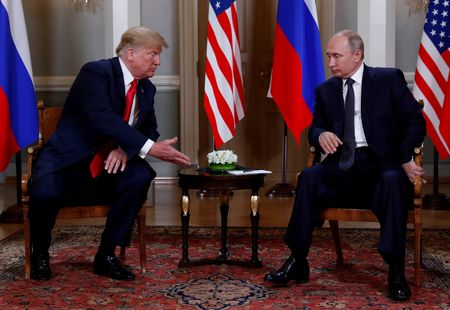By Guy Faulconbridge and Dmitry Antonov
MOSCOW (Reuters) -Russia said on Tuesday its conditions for peace in Ukraine remained unchanged since the August summit between U.S. President Donald Trump and Russian President Vladimir Putin, and that it was unclear when their next meeting would take place.
Trump has repeatedly said he wants to end the war in Ukraine, Europe's deadliest since World War Two, though he has said that finding peace has been harder than reaching a ceasefire in Gaza or ending conflict between India and Pakistan.
After speaking to Putin on October 16, Trump said U.S. Secretary of State Marco Rubio and Russian Foreign Minister Sergei Lavrov would meet this week ahead of a possible summit in Budapest within two weeks. Moscow gave no timings.
NO CHANGE TO RUSSIAN POSITION, LAVROV SAYS
Lavrov told reporters he was surprised by an "unscrupulous" CNN report which said that the anticipated Rubio-Lavrov meeting had been put on hold for the time being and that unidentified U.S. officials felt that Russia still had a "maximalist stance".
"I want to officially confirm: Russia has not changed its position compared to the understandings that were reached during the Alaska summit," Lavrov told reporters, adding that he had told Rubio precisely that.
Lavrov said that the place and the timing of the next Trump-Putin summit was less important than the substance of implementing the understandings reached in Anchorage, Alaska.
The Kremlin said there was no clear date. "Listen, we have an understanding of the presidents, but we cannot postpone what has not been finalised," Kremlin spokesman Dmitry Peskov said. "Neither President Trump nor President Putin gave exact dates."
ROOT CAUSES
Lavrov said the war's root causes had to be addressed otherwise there would be no enduring peace of the kind that Trump sought.
Putin's foreign minister of more than 21 years dismissed European demands to simply halt the war without any deeper understanding of how to address those root causes.
The Kremlin's conditions for long-lasting peace included that Ukraine would remain non-nuclear and non-aligned - not joining the U.S.-led NATO alliance - as well as protections for Russian-speakers in Ukraine.
One of Putin's most important conditions for ending the war is a demand that Western leaders pledge in writing to stop enlarging NATO eastwards. NATO says it is up to individual countries whether they want to join the alliance.
Putin, who ordered Russian troops into Ukraine in February 2022 after eight years of fighting in the country's east between Russian-backed separatists and Ukrainian government forces, has repeatedly said he is ready to talk about peace.
Ukraine and its European allies have long insisted on an immediate ceasefire in Ukraine at current battle lines before peace talks, a stance Trump publicly endorsed last Friday after a meeting with President Volodymyr Zelenskiy at the White House.
Moscow has said it wants Ukraine to cede more territory as one of several conditions it has raised for a ceasefire.
(Additional reporting by Gnaneshwar Rajan and Devika Nair in Bengaluru and Lidia Kelly in Melbourne; Writing by Guy Faulconbridge in Moscow; editing by Mark Trevelyan and Mark Heinrich)







